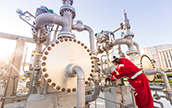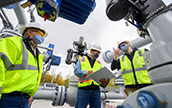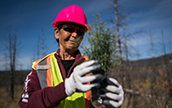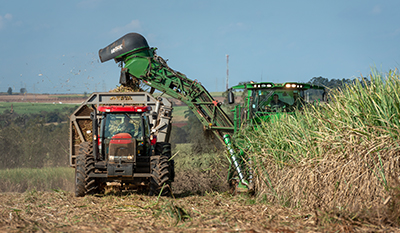Biofuels
Powering progress
Our aims include producing:
- Eight times more low-carbon fuels than in 2021 by 2030 (including Raízen production)
- Around two million tonnes of sustainable aviation fuel a year by 2025
We are producing and supplying low-carbon fuels such as biodiesel, bioethanol, renewable natural gas (also known as RNG, biogas or biomethane), renewable diesel (also known as hydrotreated vegetable oil or HVO) and sustainable aviation fuel to help lower the carbon emissions from transportation. These fuels can be blended with existing fuels, such as gasoline and aviation fuel, and do not require costly investment in new infrastructure, which means they are a practical option for reducing transport emissions.
The Raízen joint venture (Shell interest 44%, not Shell-operated) in Brazil is one of the world’s largest biofuel producers, with one of the lowest-CO2 biofuels available today. In 2021, Raízen produced around 2.5 billion litres of ethanol from sugar cane. In 2021, Raízen’s Costa Pinto mill in Brazil also produced 19 million litres of second-generation cellulosic ethanol made from inedible agricultural waste or forestry products.
In September 2021, we announced a final investment decision to build an 820,000-tonnes-a-year biofuels facility at the Energy and Chemicals Park Rotterdam, the Netherlands, which was formerly known as the Pernis refinery.
In 2021, around 9.1 billion litres of biofuels went into Shell’s petrol and diesel worldwide, which included 3.2 billion litres through our joint venture Raízen on an equity basis. In 2020, around 9.5 billion litres of biofuels went into Shell’s petrol and diesel worldwide.
Global biocomponent purchase by feedstock [A]
percentage
Sustainability of biofuels
We purchase biocomponents to blend into fuels and/or to trade. Some biofuel feedstocks are considered higher risk with regard to human rights, biodiversity or the release of carbon into the atmosphere. To help mitigate these risks, all the palm oil, sugar cane and South American soy feedstock we purchase is certified as sustainable under credible sustainability standards like the Round Table on Responsible Soy, the Roundtable for Sustainable Palm Oil and Bonsucro.
Read more about our approach to the sustainable sourcing of biocomponents.
Read more about biofuels at www.shell.com/biofuels.
Sustainable aviation fuel
We have the ambition to produce around 2 million tonnes of sustainable aviation fuel (SAF) a year by 2025 and aim to have at least 10% of our global aviation fuel sales as SAF by 2030.
Read more about SAF at www.shell.com/business-customers/aviation/the-future-of-energy/sustainable-aviation-fuel.
Renewable natural gas
As cleaner-burning fuels than diesel, liquefied natural gas (LNG) and bioLNG can help the road transport industry lower emissions and costs. In 2021, we planned to grow our European LNG refuelling stations to 50 sites by the end of 2021 for bioLNG distribution. By the end of the year, we had 44 Shell-branded LNG refuelling stations across seven countries. This is an increase on the 26 stations we had in 2020. As we grow our LNG refuelling network, we aim to offer bioLNG as a blend for further emissions reductions for our customers.
Read about LNG at www.shell.com/energy-and-innovation/natural-gas/lng-for-transport/lng-for-road.
Read about renewable natural gas at www.shell.com/energy-and-innovation/new-energies/low-carbon-fuels.









